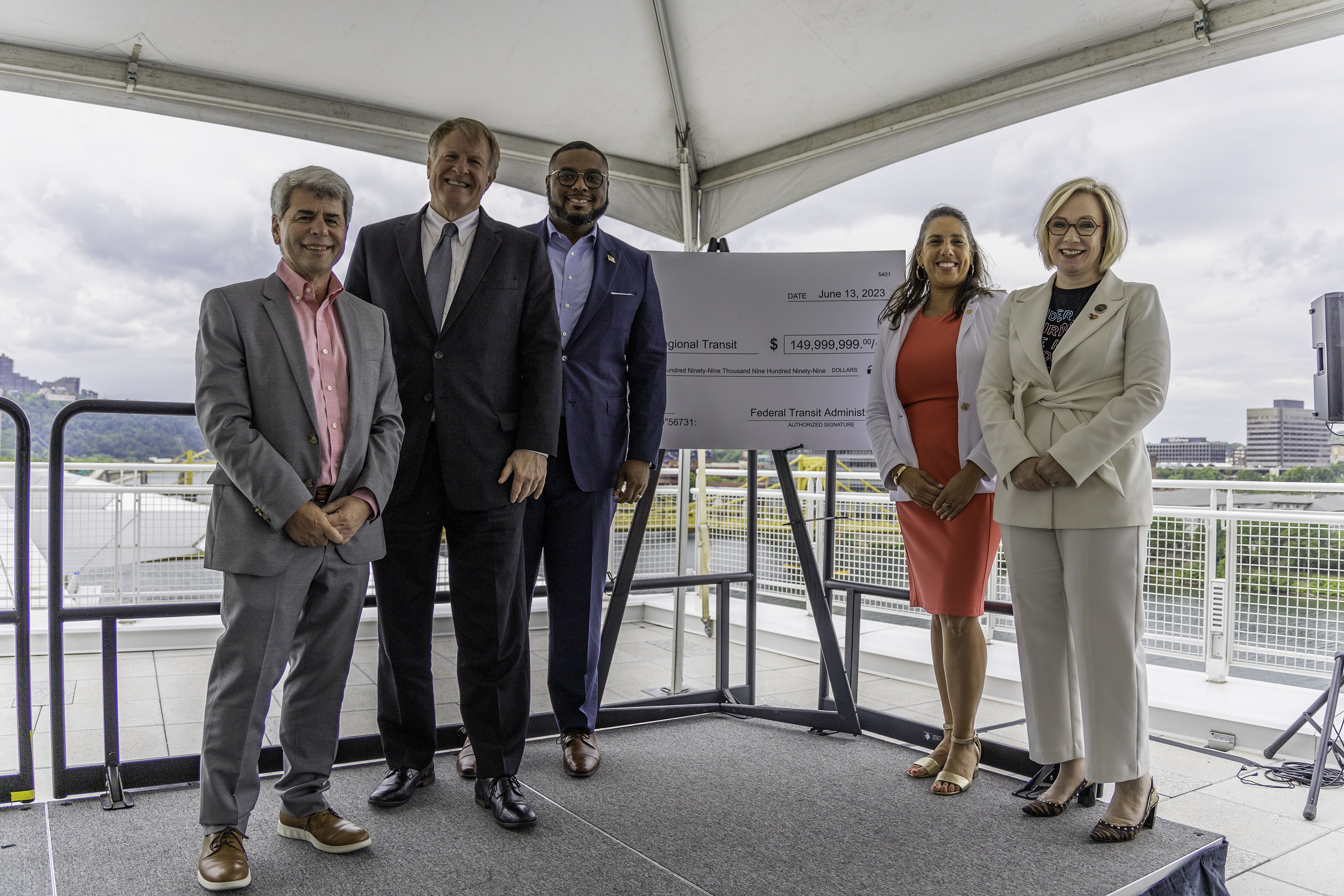Pittsburgh Regional Transit Executes $150 Million Grant Agreement with the Federal Transit Administration for Downtown-Uptown-Oakland Bus Rapid Transit Line
Project funding is now fully secured for construction on the $291 million system
June 15, 2023

Pittsburgh Regional Transit has executed a grant agreement with the Federal Transit Administration (FTA), the final step of securing all federal funding for the Downtown-Uptown-Oakland Bus Rapid Transit project. The FTA announced in 2020 it would allocate the funding for the project, and has since then developed, reviewed, and approved the grant that was awarded today.
The $150 million grant means the project has all funding in-hand to construct the $291 million system, which will provide more reliable, convenient, and faster service with improved amenities, safety features, and transit connections in downtown Pittsburgh, Uptown, and Oakland.
“The Downtown-Uptown-Oakland BRT line will improve transit speed and reliability on one of the highest transit ridership corridors in Pittsburgh,” said FTA Deputy Administrator Veronica Vanterpool, who joined PRT and local officials at the David L. Lawrence Convention Center to announce the grant award. “We are pleased to support this project that will better connect communities to jobs and education.”
The BRT line – dubbed The University Line – will include 23 new stations, exclusive transit-only and bicycle lanes, intersection improvements, accessible ramps, and more. PRT serves more than 30,000 people a day in the Downtown-Uptown-Oakland corridor, connecting the second- and third-largest job centers in Pennsylvania, and five universities – University of Pittsburgh, Carnegie Mellon University, Duquesne University, Point Park University, and Carlow University.
"This is an exciting day for the future of our region as we celebrate such a significant step in this project that has been years in the making. We are grateful for the FTA’s support, and to all of the federal agencies who have played a part in this project," said County Executive Rich Fitzgerald. "Connecting communities to reliable and accessible public transportation builds economic opportunity and increases mobility for tens of thousands of Allegheny County residents. This effort to link our first and second largest job centers with reliable, efficient, and rapid connections will be hugely impactful. We are indebted to our partners for their cooperation and collaboration, and to the public for their support that has made a project like this possible."
“The people in our neighborhoods are the greatest winners,” said Pittsburgh Mayor Ed Gainey. “We’re thankful for the Federal Transit Administration assist in securing the money needed for this city to grow and allow the project to finally happen. This will help make the connections in growing business and development areas as well as improve the ability of people to get to and from work. This is how we continue to make this a city that people want to come back to and make their home.”
The infrastructure upgrades will improve safety, speed, and efficiency of the buses that operate within the corridor and provide riders with more amenities at each station, like benches, ticket vending machines, increased lighting, and security.
“We are tremendously grateful for all our partners that have made today possible. Major projects that improve public transportation in our region are easy to imagine yet difficult to execute, so to reach this milestone is truly a testament to all those involved throughout the years,” said PRT Board Chair Jeffrey W. Letwin.
The University Line will improve transit service reliability, reduce bus bunching, and will allow PRT to redeploy the hours saved elsewhere in the county. The University Line is also expected to help spur development and create additional residential and business opportunities.
“I want to thank all of our partners who for years have worked to ensure this project remained a priority,” said PRT CEO Katharine Kelleman. “This project represents a tremendous investment in our neighborhoods, one that will serve to improve the lives of thousands of riders who travel within this corridor every day. Modern cities demand world-class transit systems that move people, connect communities, and drive vitality, and I’m proud to have helped make this project a reality.”
In addition to the $150 million grant from the FTA, The University Line is being funded through the American Rescue Plan ($19.3 million), the Congestion Mitigation Air Quality Program ($9.3 million), Allegheny County ($30 million), the City of Pittsburgh ($8.8 million), and PRT ($73.6 million).
“We are thankful to have the PRT direct meaningful regional investments in our neighborhoods. Their work to provide accessibility and connectivity within our community's bridges gaps that exist between our core needs of housing, jobs, culture and the arts. When we collectively enable access to affordable and quality housing and jobs, we create environments where people can thrive,” said Susheela Nemani-Stanger, executive director of Pittsburgh’s Urban Redevelopment Authority. “This project removes obstacles, and we are pleased to play a role in its completion.”
In March, PRT’s Board approved a $28 million contract with Independence Excavating Inc. for the first phase of construction in downtown Pittsburgh. Construction is expected to begin this fall.